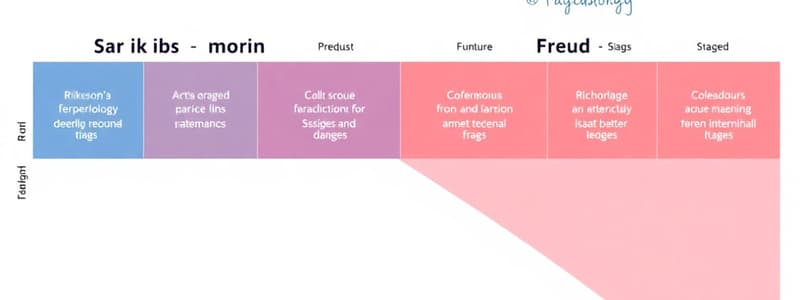Podcast
Questions and Answers
Which of the following examples best illustrates the concept of 'plasticity' in child development?
Which of the following examples best illustrates the concept of 'plasticity' in child development?
- A child inheriting their parent's introverted personality traits.
- A child born with a predisposition to musical talent excelling after years of practice. (correct)
- A child's eye color being determined by their genes.
- A child naturally preferring sweet tastes over bitter ones.
A child who consistently displays defiance and aggression after being frequently criticized and punished may be exhibiting behaviors learned through:
A child who consistently displays defiance and aggression after being frequently criticized and punished may be exhibiting behaviors learned through:
- Negative reinforcement, avoiding unpleasant tasks.
- Observational learning, mimicking aggressive behaviors seen at home. (correct)
- Positive reinforcement, as the attention reinforces those behaviors.
- Classical conditioning, associating criticism with negative emotions.
A therapist working with a teenager struggling with identity formation might draw upon which of Erikson's stages to understand the root of the teen's challenges?
A therapist working with a teenager struggling with identity formation might draw upon which of Erikson's stages to understand the root of the teen's challenges?
- Trust vs. Mistrust
- Identity vs. Role Confusion (correct)
- Autonomy vs. Shame and Doubt
- Industry vs. Inferiority
Which scenario exemplifies a teacher effectively using negative reinforcement in the classroom?
Which scenario exemplifies a teacher effectively using negative reinforcement in the classroom?
A researcher studying children's reactions to different parenting styles observes families in their homes and records their interactions. This research method aligns with the principles of:
A researcher studying children's reactions to different parenting styles observes families in their homes and records their interactions. This research method aligns with the principles of:
Flashcards
Development
Development
Patterns of growth and change in behavior, thinking, or emotions over time.
Nature
Nature
Genetic influences; inborn traits.
Nurture
Nurture
Environmental influences; learned experiences.
Plasticity
Plasticity
Signup and view all the flashcards
Positive Reinforcement
Positive Reinforcement
Signup and view all the flashcards
Study Notes
- Development involves patterns of growth and change in behavior, thinking, or emotions over time.
- Developmental defense mechanisms assist children in coping with stress and anxiety as they mature, with denial and projection being examples.
- Nature refers to genetic influences that are inborn and not learned.
- Nurture pertains to environmental influences.
- Plasticity is the degree to which development is modifiable by experience.
- Resiliency is a child's capacity to adapt and succeed despite difficult situations.
- Ethology involves studying behavior in natural settings to understand its adaptive functions.
- The sensitive period is a specific phase in a child's development when they are especially responsive to particular learning and environmental stimuli.
Freud's Psychosexual Stages
- Childhood stages impact future development.
- These stages include oral, anal, phallic, latency, and genital.
Erikson's Stages of Development
- Erikson's theory covers the entire lifespan
- It includes eight stages from infancy to old age.
- Trust vs. Mistrust (0-1 year): Infants learn to trust caregivers to meet basic needs.
- Autonomy vs. Shame and Doubt (1-3 years): Toddlers learn independence and making choices.
- Initiative vs. Guilt (3-6 years): Children start taking initiative in activities and interactions.
- Industry vs. Inferiority (6-12 years): Children develop competence through academic and social activities.
Conditioning and Learning
- Classical conditioning starts with reflexes that are preexisting stimulus-response associations.
- Operant conditioning involves consequences to strengthen or weaken existing behavior.
- Observational learning is when a child imitates an action they observed someone else perform.
- Positive reinforcement adds a desirable stimulus.
- Negative reinforcement removes an undesirable stimulus.
- Positive punishment adds an undesirable stimulus.
- Negative punishment removes a desirable stimulus.
Studying That Suits You
Use AI to generate personalized quizzes and flashcards to suit your learning preferences.




